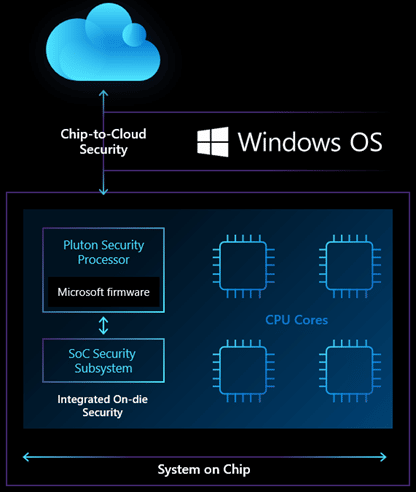What Is Microsoft Pluton? Why We Need It?
Microsoft Pluton is a security processor unveiled recently which can withstand all kinds of cyber attacks and keep your data safe. The security processor was first introduced by Microsoft in November 2020. It is the world’s first to offer a “protected enclosure” that safeguards against tampering from outside hackers. Pluton is a new type of hardware security that stores sensitive information like passwords & encryption keys at the hardware level, meaning they are protected against any malicious software.
The release date for AMD laptops with the Pluton chip has been announced by Microsoft to be January 2022. Microsoft will be releasing a new batch of computers with the Windows 11 Pluton security processor in 2022, featuring AMD’s Ryzen 6000 series. Xbox consoles already have a technology similar to Pluton to protect sensitive data and Microsoft is working on adding it to more devices.
How Does Microsoft Pluton Work?

Pluton has a completely different approach to sensitive data storage compared to an ordinary processor. The CPU interacts with a separate piece of hardware called the Trusted Platform Module (TPM) that provides guidelines for protecting this data. Security threats are getting more sophisticated by the day. However, TPM could prevent attackers from tampering with your PC’s firmware, thus reducing the chances of malware injection.
The Introduction of TPM
The introduction of TPM on PCs was a huge win for security but it also had unintended consequences. Attackers have more creative ways to attack systems. This has made attacks easier. If someone can intercept the CPU then they can exploit that instead. Despite this, Pluton has taken measures to ensure that the vulnerability is eliminated.
Pluton replaces the need for external communication between the CPU and an active security chip. Options to protect a CPU from intrusions would be to install a separate security chip or to embed it in the CPU. Consequently, the addition of Microsoft Pluton to a PC makes it difficult for attackers to collect information.
Microsoft’s Security Processor is a combination of versions of TPM inserted into the CPU. The TPM (Trusted Platform Module) chip is one of the hardware security features that computers can have. It provides Windows Hello authentication and BitLocker encryption among others. Pluton is an example of a new form of hardware-based security, which follows Apple’s T2 chip that’s located on Macs and Google’s Titan M chip, which is on Pixel devices.
The Future of Microsoft’s Security Processor
Pluton’s sole and only job is to guard sensitive information like passwords, encryption keys, and credentials. It uses Secure Hardware Cryptography to encrypt important information.
AMD chipsets will be around for a while and more new computers will come with them. Microsoft also partnered with Intel & Qualcomm on Pluton to integrate it with their chips. Moreover, Windows Update will be able to automatically install new firmware updates for the chip on a regular basis, just like it does for other aspects of your PC.
Microsoft is not the only company working on improving computer hardware security. Other companies are focusing on this as well to ensure that automation, robotics, and other technologies can be used with confidence. In 2016, Apple also got in on the trend by introducing the T1 chip on its MacBooks and T2 security chip. Google has recently introduced a chip to improve the security of its Pixel devices.
Final Words
Microsoft unveiled their new security processor, Microsoft Pluton. It is able to contain any cyber-attacks and ensure data security for you. It will be embedded in devices like laptops, desktop computers, tablets, and smartphones to provide protection against hackers. The step taken by Microsoft is definitely is the requirement of the current world and needed to be implemented as soon as possible. What are your thoughts about this new Microsoft Pluton processor? Let me know in the comments below.
Spread the love
I appreciate you sharing this blog post. Thanks Again. Cool.
I just like the helpful information you provide in your articles